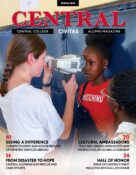Steve Ybarrola taught anthropology at Central from 1991-2006. He is now professor of cultural anthropology at Asbury Theological Seminary in Wilmore, Ky.
Q: What did you teach at Central?
I came to fill a vacant anthropology position. I was the only anthropologist in the department of sociology and anthropology until we hired our second anthropologist in 2003 (I believe that was the year). I started as an instructor (1991) and was promoted through the years to assistant professor (1994), associate professor (1997) and professor (2004). I was tenured in 1997. I also served as the Frank and Grace Moore Chair in Anthropology from 2001-2006.
Q: What do you like most about anthropology?
Anthropology gave me a global perspective that helped me to place my own culture and nationalism within a broader framework. I think this is one of the key things that anthropology does—it helps us to deal with our own ethnocentrism (i.e., the belief that our ways of doing things are right, good and better than the ways of other peoples).
Anthropology helps us to make the strange things familiar, and the familiar things strange. A personal example of this is when I was in Brazil in 1979. I went to see a movie, and before the movie started there was a film that played the Brazilian National Anthem, with many images of Brazilian culture and nationalism. I immediately thought, “This is unbelievable. What does Brazilian nationalism have to do with watching a movie? This is Jingoism!” Of course, it didn’t take long before I reflected on my own culture and realized that we did the exact same thing before most sporting events; we play the national anthem, people stand and face the flag, remove their hats and many place their hands over their hearts, signifying the importance and power of their nationalist feelings.
This helped me to see that what I first thought was strange—the Brazilian nationalist images before a movie—was actually very similar to what we do in the U.S. before every sporting event. And it made what I had always taken as familiar—the national anthem before sporting events—seem rather strange to me; it caused me to question why we do that. This is a rather simple example of what anthropology does for us.
Q: What do you miss most about Central?
Over the years I developed many good friends at the school, and I miss them dearly. In addition, I learned how to teach there, through the helpful mentoring of many of my colleagues. Especially in my early years, I sought out colleagues in different departments to help me develop my own teaching style. In my department we spent many hours every week talking with one another about how to teach more effectively. I owe whatever effective teaching techniques I use today to those interactions with my Central colleagues, and I am forever indebted to them for fostering my desire to teach in such a way that learning is based less on “me” and more on “us.”
Q: What are your memories of Central?
I have many vivid memories of Central. I remember an interdisciplinary group of faculty (e.g., anthropology, English, biology, math, communications, political science) forming a bowling team so that we could develop friendships among ourselves, as well as with the broader non-college community. On the first night of the bowling league, we didn’t know what to call ourselves. We were thinking of such names as “Spare Me.” But as we contemplated a name, one of the members of the opposite team (a Vermeer team) asked, “Aren’t you all professors at Central?” When we told him we were, he asked, “Why don’t you just call yourselves “The Professors”? So we became “The Professors” which led to the ridicule of the other teams, not because we were “professors” but because we were so bad!
My other key remembrance has to do with the “field schools” I helped to create with some of my colleagues. The first was the Basque Ethnographic Field School that I, along with my colleagues Kendall Brousten and Keith Yanner, conducted in 1995. The Basque field schools were conducted in 1995, 1997, 1999, 2001 and 2004. In 2005, Tim Knickerbocker (our other anthropologist) and I conducted the ethnographic field school in Wales.
Q: What do you do currently?
When I left Central, I took a position as professor of cultural anthropology at Asbury Theological Seminary. I have absolutely loved teaching at Asbury because it has allowed me to teach in a very applied way with anthropology related to social problems. I am no longer just teaching anthropology, but am also teaching how we can apply what we learn to the betterment of humanity.
Q: Do you have any hobbies?
I am an academic, so much of my “free time” is spent reading books and articles related to my discipline. My one hobby is golf, which I most often practice when I am in California with my family.
Q: Is there anything you miss about Iowa?
I miss going tailgating with our friends who were U of Iowa alums.
Q: Final thoughts?
Our time in Iowa (15 years) was very formative for my family. My children grew up there, and my wife and I developed lifelong friendships.













To encourage serious, intellectual discourse on Civitas, please include your first and last name when commenting. Anonymous comments will be removed.
Comments are closed.